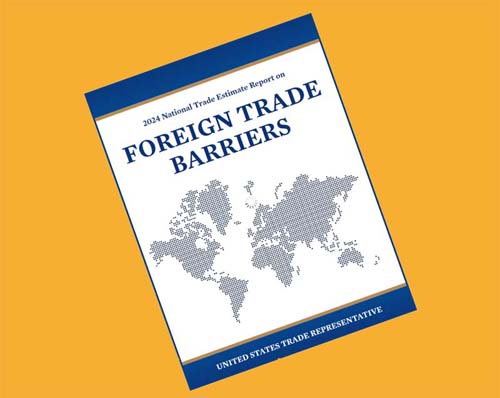
Anodyne public pronouncements to the contrary, all is not hunky dory when it comes to trade issues between India and the US.
In the section on India, the annual ‘National Trade Estimate Report 2024’ on Foreign Trade Barriers, released last week by the US Trade Representative’s office, explains that “India’s tariff rates are announced with the annual budget and are modified on an ad hoc basis through notifications in the Gazette of India.”
“The tariff rates are subject to numerous exemptions that vary according to the product, user, intended use, or specific export promotion program.”
The report suggests that “this renders India’s customs system complex and open to administrative discretion”
As a result, “U.S. companies have also faced extensive investigations related to their use of certain valuation methodologies when importing computer equipment… and have reported being subject to extensive searches and seizures of imports that do not appear to be risk-based.”
The requirement by India’s customs authority of extensive clearance documentation, the report says “often leads to lengthy processing delay.”
Different ministries, different procedures
Multiple ministries mandating different procedures, is another hassle that is highlighted: “India lacks an overarching government procurement policy and, as a result, its government procurement practices and procedures vary among different ministries within the central government.”
The requirement of an “offset program” when it comes to India’s defence procurements, “which requires companies to invest 30 percent or more of the acquisition cost of contracts above the threshold value in Indian-produced parts, equipment, or services, continues to be challenging for manufacturers of high-technology equipment to meet given changing rules and limited opportunities.”
Patent confidentiality
US stakeholders’ perception of India’s overall Intellectual Property (IP) regime is negative in main because patent applicants “continue to face long waiting periods to receive patent grants, and excessive reporting requirements.”
“Concerns remain with respect to whether Indian authorities will treat as confidential sensitive business information that parties are required to disclose on the current “Statement of Working of Patents” (Form 27).”
Satellite Services
When it comes to satellite based services in India, the report bemoans the lack of an ‘Open Skies” Policy and suggests that Indian policy of taking a commission on any foreign satellite feed used, kicks up the total cost and reduces consumers’ flexibility:
“Direct To Home (DTH) licensees must procure satellite capacity through Antrix, the commercial arm of the Indian Space Research Organization (ISRO), which in turn only permits foreign procurements if it does not have available capacity on Indian satellites. When ISRO does permit the use of foreign satellite capacity, the foreign satellite operator must sell the capacity to ISRO, which in turn resells the capacity to the end-user with a surcharge.”
Published annually since 1985, this year’s NTE Report covers significant foreign trade barriers in 59 markets. Releasing the report, United States Trade Representative Katherine Tai said: “We respect that each government—including our own—has the sovereign right to govern in the public interest and to regulate for legitimate public policy reasons.” She underlines the intent to make it a “useful document that enumerates significant trade barriers that could be addressed to expand market opportunities and help our economy grow.”
Laptop imports: Was there a policy rethink?
A few days before the release of the NTE Report, Reuters reported, based on US government documents and emails, obtained under the open records request, that the virtual reversal of last August’s controversial Indian policy of requiring import licenses for the import of laptops, tablets and similar electronic goods, was largely due to intense lobbying by US officials.
This protectionist policy which many even in the Indian media likened to the notorious “permit-licence Raj” of the 1970s, impacted leading American manufacturers like HP and Dell. After widespread criticism in the Indian and global media, the licensing system was watered down to an “import management system” for IT hardware, requiring voluntary declarations and finally pushed by a year – which seemed tantamount to saying ‘we’re calling it off’.
Concerns were raised by US, China, South Korea and Taiwan at World Trade Organisation meetings about potential violations of WTO free trade agreements to which India was a signatory. The US Trade Representative, Katherine Tai, came to Delhi to emphasise US discomfort with the proposed controls and the Reuters story suggests that such high level interventions were ultimately successful.
The news report also quotes unnamed Indian officials denying that the reversal was due to US pressure, more a realization that the indigenous manufacturing capability was not yet up to meeting India’s needs for this computer hardware.
But read with the subsequent NTE report, it does suggest that Indo-US trade particularly in high tech areas is still at best a work in progress – or at worst, a game of who blinks first.
Thia has appeared in a shorter version in NewIndiaAbroad